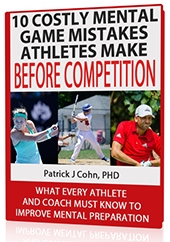
Benefits of Sports Psychology For Parents
Sports parents, did you know that 75% of all young athletes drop out of sports by the time they are 13?
They drop out because taking part in youth athletics is no longer enjoyable for them. Sports Psychology for parents can help you keep kids in sports and enjoy it more.
As a parent, you have the ability and responsibility to ensure that your child or teen reaps all the physical, social and emotional benefits of playing sports – and stays “in the game.”
Whether you’re the parent of a top-level competitor or the parent of a young child who just joined her first team, you can improve your child’s confidence and enjoyment in sports.
Young athletes are challenged with the many expectations and “mental game” pressures associated with taking part in youth sports programs today.
What are the most common “mental game” challenges for kids.
And how do you become The Ultimate Sports Parent: a parent who knows just what to do when dealing with a sad, upset, frustrated, tense, worried, underperforming, perfectionist or self-defeating young athlete!
Our work has shown that all young athletes are challenged with the following issues (to varying degrees). Sports kids:
- Worry too much about what others think of their performance.
- Lose confidence due to doubt and negative thoughts about their performance.
- Lack well-defined or specific goals.
- Become easily frustrated and have trouble letting go of their mistakes.
- Struggle with perfectionism, over-analyzing their mistakes and focusing too much on being “perfect.”
- Get overly tense and worried as a result of internal and external expectations or pressures to “win.”
- Have difficulty trusting what they have learned in practice, and thus can’t play “freely” in crunch-time.
Meanwhile, sports parents, in their efforts to support their children, struggle with these challenges (to varying degrees):
- Understanding how to motivate their children without pressuring them.
- Helping their children participate in a more assertive or competitive fashion.
- Finding the best way to communicate with their sports kids to enhance confidence.
- Helping kids deal with distractions that undermine their performance and confidence.
- Knowing what to do or say after a child’s loss or mistake.
- Dealing with negative or untrained coaches that are not supportive.
- Supporting kids when their coach gives them too little playing time.
Positive communication is the most important skill you can possess as a sports parent.
Your communication style influences how much satisfaction and self-confidence your child derives from sports.
Supportive communication can help your child develop the self-confidence she needs to perform her best. Negative communication can hinder your children’s confidence.
Young athletes enjoy sports less and tend to under-perform when their parents criticize them.
Related Sports Psychology Articles:
- How Parents Can Help Sports Kids Stay Safe
- What Should Sports Parents NOT Do?
- How Parents Can Help Kids Stay in Sports
Free Mental Toughness Reports

Get instant access to a mental game report to improve your mental toughness. Are you making one or more of these “deadly” mental game mistakes prior to competition? You can improve your mental game with one of our free sports-specific reports below.
with our free mental toughness reports, you’ll:
- Discover if you have positive or negative pregame jitters.
- Identify your pre-competition mental game mistakes.
- Learn the important pregame mental skills to boost your performance and success!
Learn how mental game strategies can boost your mental toughness in sports with Dr. Cohn’s free mental game reports!
